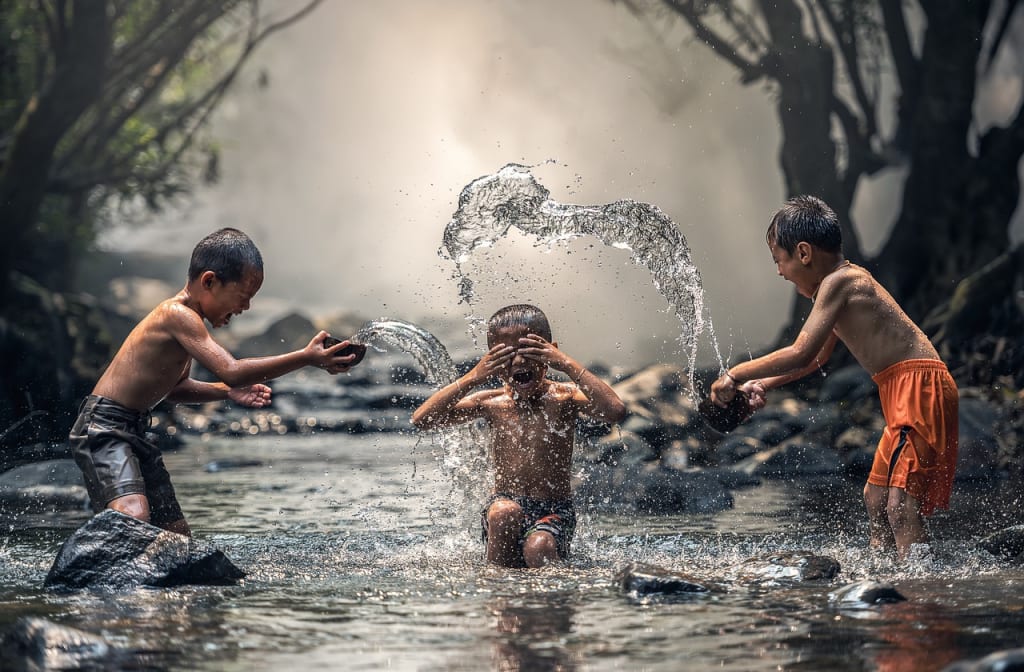
Most of the children in my village go to school barefoot, without shoes, one reason for sure, is because we don't have enough money to buy shoes, besides that, when the rainy season comes, the unpaved roads in our village will turn like buffalo puddles because they are so muddy. I myself often wear flip-flops when I go to school. Likewise with school supplies, our book bags simply consist of plastic bags that have holes in the top two ends, we carry them on our backs like normal backpacks.
When we were in elementary school, I and many of my friends my age were never restricted from playing by our parents. So, when the rainy season arrived and the Ciraja river next to my village flooded for several days, in the afternoon after school we were not prohibited from playing "Papalidan", which is a game of drowning ourselves in a flooded river. To make this game more lively and exciting, a group of us went upstream of the river at the end of our village, then immersed ourselves downstream, right at the other end of our village, because the river surrounds half of our village. "Papalidan" would be happier if we floated up the river from upstream using banana stems that we had cut into pieces like canoes. But when the flood starts to recede, we no longer play "Papalidan", we just bathe in a group in the river, playing cat and mouse in the water until our eyes sting because we often get water. This game will show which of us is the best at swimming and the best long dive in the water.
When the rainy season ends and the dry season comes, after school we sometimes went to the pine forest next to the village, to look for firewood. We deliberately looked for dry firewood so that it wouldn't be too heavy to carry, so to get it, we had to climb up the trunks of pine trees to get dry branches. We had to climb at least 3 pine trees to get two bundles of firewood to take home. However, on the way home, I often find it difficult to carry the load of firewood because it exceeds my limits, so I have to throw away a small portion of the wood so that it doesn't weigh me down too much.
When the harvest season arrives, I join my parents in cutting rice in the rice fields. If it's a Sunday, I even go to the fields early in the morning after dawn, so I can help my parents before the heat of the sun. In fact, a few weeks before the rice harvest arrived, I had helped my father and mother protect the rice from attacks by sparrows. I do this, usually with the help of my brother and sister, in the morning before school and in the afternoon after school until dusk falls. We did all this with happy hearts, because there was a National branded transistor radio which always accompanied me to listen to pop songs at that time.
I, and almost all the children in my village, have to earn their own money to buy candy. At that time, in my village and other villages, people still liked to make bricks to build their houses. Usually, the location for making bricks is in a rice field area which is located some distance from the village. In the manufacturing process, first they make a brick mold, then mix the rice field soil with husks and then knead it into brick dough. After the mixture of soil and husk was evenly distributed, they then molded it using the tools they had made, dried it in the sun, after drying it, then arranged it in such a way that there were cavities on each side of the pile of raw bricks, to be filled with firewood and then burned.
After the bricks were cooked, the owner offered to the villagers, who wanted to transport the bricks to the owner's house in exchange for a certain amount of money. Rewards are based on how much we can transport. To get a fairly large payment, we had to carry the bricks back and forth until a lot was collected. After they had all been transported, the owner would count how many bricks each person could carry. If I remember correctly, one brick was priced at 10 silver. That's one way for us village children to earn pocket money. Central Java, Indonesia, 1986-1991.





Comments
There are no comments for this story
Be the first to respond and start the conversation.